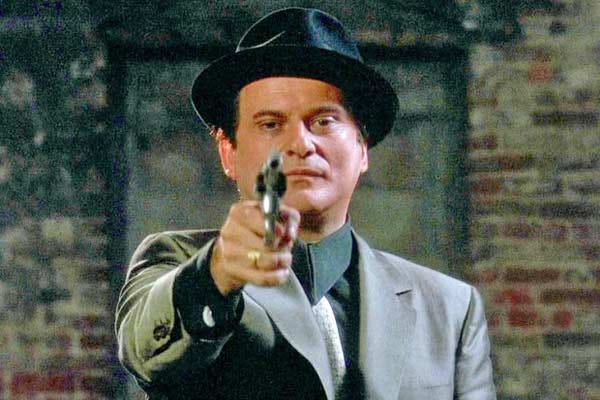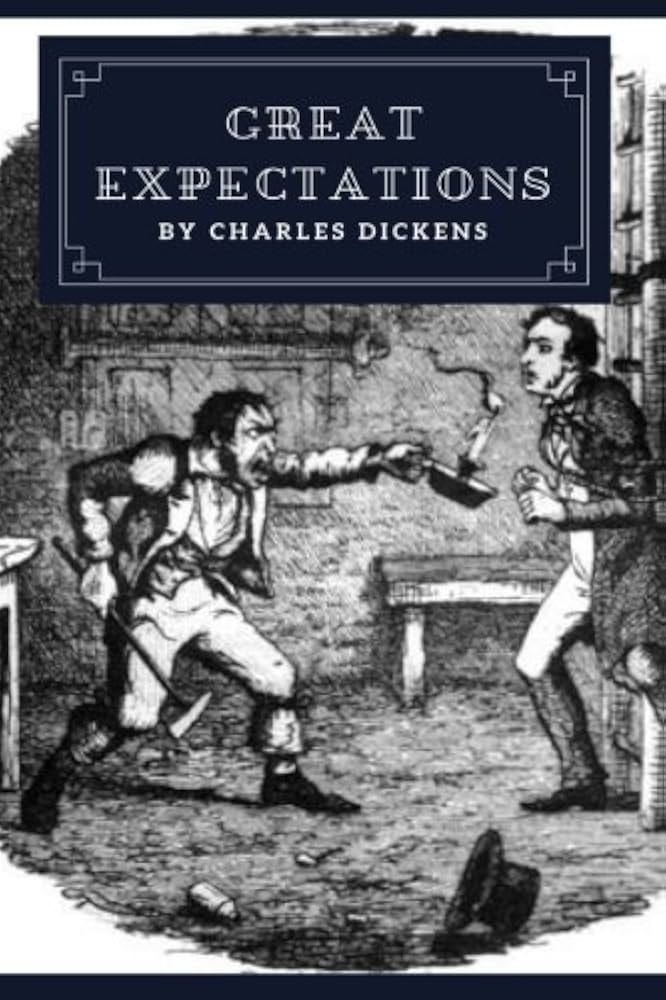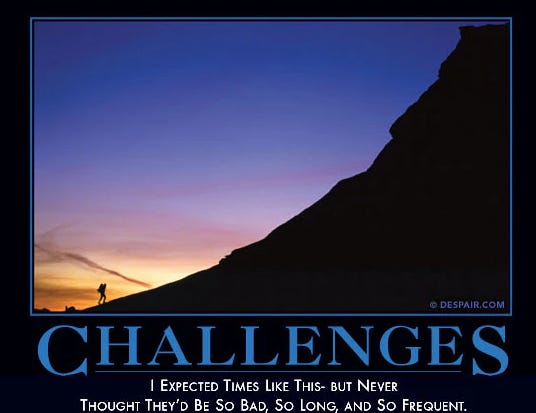Fired at Christmas: It Sucked. It Took Me 8 Years to Acknowledge That
8 Personal and professional lessons learned as the VP of Content at a marketing agency with a flawed-from-the-beginning business model.
8 years and 2 days ago I was fired.
I was surprised. I wasn’t shocked.
Funny, it was four years after I had written blog posts they needed in a rush – while on Christmas vacation to England to visit the ex-wife’s family – and before I was employed by them. No good deed, right?
Anyway.
You throw a pebble in a pond, and you get gentle ripples that quickly die out.
Toss in a boulder and the ripples become waves and reach further and rebound on each other.
This was a boulder that I thought was a pebble.
Here’s what I’ve learned from the overlap between professional and personal failure. I hope anyone who’s been through the same or similar might take some solace in this; and accelerate their learning and healing process.
The Whacking
“Can we chat” read the email from Bill, late afternoon, Friday, December 21, 2018.
I knew.
Don’t remember the specifics of the call, but I was “being let go.” I got all the regular platitudes about doing great work and appreciate you and blah blah blahdy blah blah. He meant it, but it all sounds fairly hollow when the only thing you’re thinking is your paycheck just disappeared.
Along with, “Seriously, the Friday afternoon before Christmas AFTER I do a day of work and planning for next year?”
The walk upstairs to tell my then-wife was one I hope you never have had to or will experience, especially given four years before, I had been whacked along with five others from the place we both worked.
It wasn’t unexpected, though I didn’t think we were all the way to the “agency tanking” phase. I had been doing some desultory (i.e., hardly any) job searching for a few months.
If you’ve been inside a struggling business, you know that tingly spidey sense telling you things aren’t going right. The hammer’s coming.
And you know that hammer ain’t dropping on the owner.
It wasn’t my fault. In most ways it wasn’t anyone’s fault (more on that in a moment). Sometimes businesses fail. We had all of the right ingredients, but never quite put together a delicious meal.
We did good work.
We brought in leads.
We improved client websites.
We created websites, assets, and email nurture campaigns clients continued to use after we shut down.
Hell, we were a HubSpot Platinum Partner for a time.
All of our efforts weren’t enough.
They say business isn’t personal. It sure as hell feels personal when your efforts couldn’t get a company over the hump.
I had memory-holed a lot of this because it felt like failure.
Which it was.
But I also kept blaming myself.
Which it wasn’t (entirely).
It sucked. And it’s low-key held me back for the past eight years; including my time as editor of a newsletter called The Document Imaging Report, freelance writing, and marketing work with a handful of clients.
Here’s what I’ve learned as I thought through what happened, what it meant, and how I, and hopefully you, can avoid this kind of unhappy Christmas surprise in the future.
I’m going to attack this from two angles, personal and business. Business first, as it’s more useful.
Lesson 1: The Original Sin of Over-Promising and Under-Charging.
Our agency sold inbound marketing to copier dealers. The owner of our agency had a marketing agency that was a website and content mill for copier dealers. He was making good money with it but wanted to tap into the new inbound marketing trend.
So he tapped Lindsay (my favorite work-wife ever!). She brought me on to handle all of the content strategy and writing. We purloined Kate to be our HubSpot monkey from a company that didn’t become a client. Pulley was our sales guy. John handled social media.
It was a solid team of complementary players. We all liked each other even.
The problem: the owner . . . is a salesman. I can never 100% settle on if “used car” is the right modifier to use before that. To snag two influential clients for momentum, he had oversold the speed of inbound results to those owners.
Worse, he way undercharged them.
We started off literally underwater. This could have worked out if he had set expectations from the beginning.
He didn’t. I should’ve known we were screwed.
Charge enough to stay in business from the beginning, even if you have financial resources to lose money for a while.
And don’t tell a potential customer what they want to hear just to make the sale. It’ll end in tears.
Lesson 2: Cheap Clients Who Don’t Trust You Aren’t Worth It
We started with four clients; one a very small family business. The owner was 1. Cheap and 2. Constantly questioning us.
Because of the continual hand-holding, we devoted more time than we could afford. Then he decided not to continue with the contract anyway after we delivered the initial nurture campaign.
Had we spent the energy with our two big clients, I might be VP of Content Strategy for a successful agency right now.
Lesson 3: Companies Say They Want to Be Different. Most Are Lying.
The biggest reason we lost out on clients was their fear of trying something new. Not many other dealers were doing inbound, so many thought: why would we?
If you want to be different, you have to be different.
Lesson 4: Set Expectations
We did our onboarding with the two large clients in person. Had everyone in the room, gathered pain points and language to use in our content, got buy-in for the first campaign, etc.
We continually stressed that this was a long-term plan. That it would take us three months to set up HubSpot, create the initial nurture campaign workflow, asset, supporting blogs, etc.
We were early on delivery for our initial clients. Literally three days after we launched, we had the president of one of them asking us where the leads were.
Now, we were starting from scratch with websites reaching maybe 1,000 visitors per month. And three-quarters of those were existing customers paying their monthly bill.
Instead of pushing back, our owner just kept tap-dancing away that leads will soon be raining down upon their heads. That was less-than-helpful.
Lesson 4: Clients Will Blame You For Their Failings
This one continues to blow my mind. None of the companies we worked with tracked the results of any previous marketing campaigns to sales.
Hubspot is both a CRM and sales platform – but you have to purchase each separately. Most dealers ran their back-ends on a crappy sales product that had captured the market. It didn’t connect to HubSpot.
Suddenly because we could track leads, some clients wanted us to tie leads to sales. While ideal, we weren’t being paid to do this. Worse, we couldn’t given we had no access to their systems. While we did eventually figure out a way to manually backtrack and guess at which sales we influenced, it was lacking.
Lesson 5: If You Can’t Tie Marketing Efforts to Sales; You’re F*cked
The irony is all of us knew how to track this, but the systems we were using didn’t talk to each other.
So even though we began delivering leads to all of our clients as the content gained traction, not being able to tie it to sales knee-capped us.
Who do you think is going to get axed? Those damn consultants or the guy the owner has been having lunch and playing golf with for a decade and whose kids play on the same little league soccer team?
Lesson 6: Start With Low-Hanging Fruit
I kick myself for not realizing this sooner. I fell victim to my own hubris. Lindsay and I looked at each other in a Slack meeting mid-way through 2017 and both realized how obvious this mistake was at the same time.
Out of our six larger clients, five of the initial campaigns focused on brand new services offerings – either managed IT services (mostly data backup) or document management.
The internal sales folks didn’t understand what they were selling. They were used to selling a box, not a service beyond managed print services (you essentially rent the copier and are billed by volume of usage of the print, copy, and scan functionality).
No one knew they offered these services, even long-time customers.
Rather than using inbound to double-down on what they were already effectively selling, we were starting from zero with these brand-new offerings.
We did get leads and eventually sales, but it took longer – especially as the sales cycle itself is longer for these products.
This just compounded the impatience I mentioned already.
After Lindsay and I had our epiphany, we started our next client off with a focused managed print service campaign before moving on to their managed services and document management offerings. Gaining success and traction early with a service they were already know for greased the skids for a much easier engagement.
Lesson 7: There Is No Such Thing as a Boring Industry
Copiers, right? Snore. Nope. The engineering for the paper path in a copier is freaking amazing. And they are valuable pieces of technology for initiatives like digital transformation.
There are toner pirates, broken glass because people really did try to copy their buttocks, dead rats in paper trays, copiers are a key attack vector for cybercriminals, and there is a plethora of “how to’s” to write that are interesting.
There are boring marketers, but you can find something interesting in every industry. That’s your job.
Wallow, But Not For Too Long, and Positivity Fetishes
I enjoyed my time and the work that I did at the agency. It was always interesting and we did help our clients get more business.
That felt good.
Now, looking back after eight years, I realized that I didn’t take the time to think about how being fired twice in four years affected me.
There’s a positivity fetish that is a good thing. Monty Python was right, “Always look on the bright side of life.”
But sometimes I think we just need a good wallow in self-pity. A little navel-gazing at the wrongs and ills that have been done to us.
Shake your fist at the heavens.
Blow out the candles in church. (OK, maybe not.)
Give things that suck time to suck.
Don’t and that stuff can haunt you until you do.
You can start to devour yourself from the inside, sometimes without even knowing it.
My problem is that I didn’t let it hurt. Shoved it down. Locked it away. Tried to be there to support my then wife as she had a tough time professionally. For my daughters when it was my week (week on/off joint custody). Not having your own emotional needs met hurts. Makes you feel “less” and unseen. All chunks bitten out of your soul.
While sporadically looking for work, I’d play games, read, cook, drinks in the evening . . . most anything to not think about me. All tiny nibbles at my core.
It did knock me back some. I knew that. But I realized over the last year that it affected my confidence more than I allowed myself to think about.
Around this time last year, I realized how tired – how worn out – I was.
Never had felt permission to be tired and worn out.
If you’ve gotten this far and take anything away from this: give yourself permission to feel that tiredness.
But don’t let it fester.
Have a good think about what’s going on in your life and inside your head.
Then move. Take action, don’t just make plans.
Final Thought on Positivity
I’m wired in a way that too much positivity sets my teeth on edge. I generally like a little bitter with the sweet.
I’ll often sound negative while feeling 100% positive.
One thing I realized is that I took the failure of this business too hard. I kept thinking, when I thought of those four years at all, that I could’ve done better. More. Been faster. Smarter.
The truth is I did my damdest. Wasn’t perfect and I wasn’t always right. Earlier this year, I took a look at some of these past client sites (hadn’t looked in a few years). The core of three of the websites are still up, some with my writing and CTAs. Assets have been revised, but still in use. Some of the blogs have been rewritten but the core of them is still my original content.
So, yeah, I wasn’t as bad at this at I had told myself over the years.
I had memory-holed all of the good stuff we did, some of it I shared in the lessons. I had forgotten to be proud of some really good work that helped these folks move their businesses up and to the right.
I’ve finally hit a balance of accepting both the good and the bad of this past. Sorted out a return to the guy I used to be; confident in my ability, but aware of my limitations instead of a hyperfocus on my faults.
Next year, and every year after, is going to be filled with mistakes. But it’s also going to be filled with a renewed focus on helping clients connect with their customers through useful, helpful content.
It’s going to be a simply useful year.
Who else has been fired at Christmas? Or anytime else. Share your story and, together, let’s make fun of those idjits who let us go!









Very interesting post Bryant! I always tell myself 'what's the worst thing that could happen' and try to solve from that. Got used to the positivity posters, but never embraced them fully. A couple of years ago actually read something that confirmed they are not as useful to our mind.
Glad you’ve taken the time to reflect and tease out the lessons. For me it’s a good reminder to give myself time to process the not-so-good parts of life.